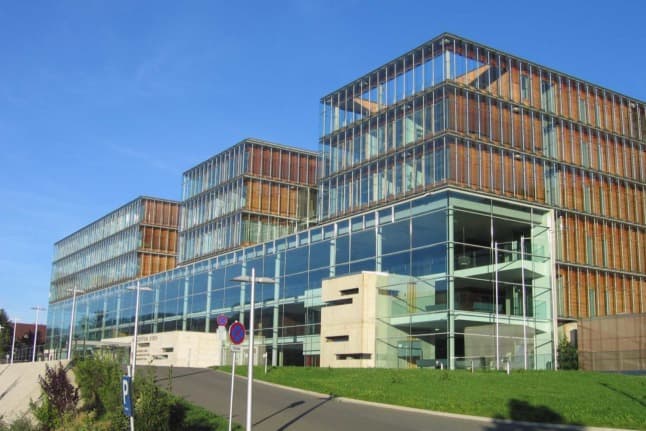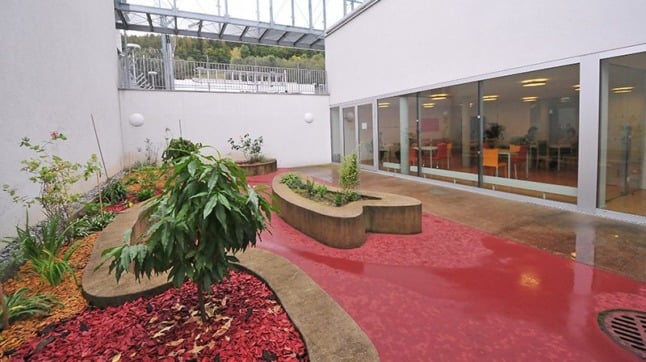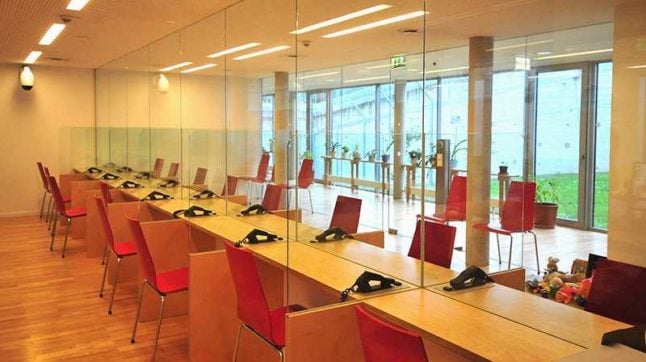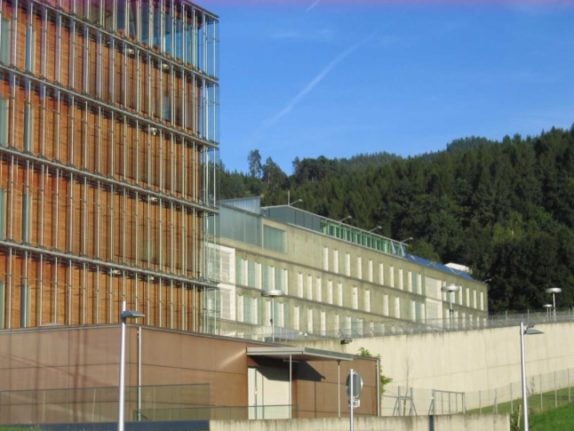‘You’d stay here voluntarily’: Inside Austria’s ‘luxury’ Leoben prison

Austria’s Leoben Justice Centre, located in the southeastern state of Styria, consistently ranks as one of the best prisons in the world.
So much so in fact that inmates reportedly told Swiss tabloid Blick “you’d stay here voluntarily - nobody will break out” when asked about the conditions.
Nicknamed a “designer prison” in the German magazine Focus, the prison boasts sporting facilities, prayer rooms of various religious denominations, outdoor sports fields, table tennis tables, fitness rooms and romantic conjugal rooms for couples.
If they’re tired of working out and conjugal visits, inmates can take computer and language courses.
Instead of being served prison food, they cook it themselves, with vegan, Muslim and other specialist diets catered to. Prison uniforms have been phased out, with prisoners allowed to bring and wear their own clothes.
The prison was completed in 2004, making it Austria’s first new prison since the 1970s.

Austria's 'luxury' Leoben Prison. Photo: Bundesimmobiliengesellschaft
Leoben’s reputation as a “designer prison” is somewhat earned, considering it was built according to a design by architect Josef Hohensinn and cost roughly €25 million.
It was designed to prevent overcrowding, with no more than the maximum limit of 205 able to be imprisoned at one time.
The front door of the prison is emblazoned with Article 10 of the UN Convention on Human Rights: “All persons deprived of their liberty shall be treated with humanity and with respect for the inherent dignity of the human person.”
Those serving in the minimum security jail are all sentenced to less than 18 months in prison, but can be sentenced for a variety of crimes.
This has been by design, with authorities wanting to avoid Leoben becoming a cushy, white-collar prison.

Austria's 'luxury' Leoben Prison. Photo: Bundesimmobiliengesellschaft
“Contact with the outside world is very important”
Friedrichs Wolfslehner, the deputy director of the facility, told Focus that rehabilitation was the priority at Leoben,
"We don't just want to lock up prisoners here,” he said.
“Keeping contact with the outside world is very important."
People can visit prisoners without having to make an appointment.
Gunter M, a 54-year-old prisoner serving a ten-year sentence for economic fraud, was allowed to serve out the end of his term in the prison.

Austria's Leoben Prison. Photo: Creative Commons, Von Daniela Ebner (uploaded by User:Plani) - Eigenes Werk, CC BY-SA 3.0,
"It's a luxury establishment," he told Focus. "You're locked up and that's a psychological burden. But everything is much easier here."
The prison has captured the world’s attention since it has been built.
The New York Times wrote that the cells were bigger than the average New York apartment, with the journalist saying he was considering moving to Austria and committing a crime just to get in.
“Inside the prison it felt like Sunday afternoon, though in fact it was a Tuesday. There was a glassy brightness over everything, and most surprising, an unbreakable silence,” wrote the NYT when visiting in 2009.
Leoben has already been an inspiration abroad, with the Heidering correctional facility (JVA Heidering) on the outskirts of Berlin opening in 2013, having been designed by the same architect largely according to the same principles.
The exception rather than the rule?
While the prison may have made headlines across the globe, it appears that Leoben is the exception rather than the rule.
The majority of Austria’s prisons are at least half a century old, with frequent complaints of poor facilities, understaffing and overcrowding.
There are approximately 10,000 people housed in Austria’s 28 prisons, meaning Leoben represents only three percent of the Austrian prison population.
A 2021 report by Austria’s Die Presse magazine showed that 72 percent of prisoners experienced violence during their stays, while every sixth person was held in an overcrowded cell - with some sleeping in a room with ten others.
So for anyone thinking of taking a leaf out of the NYT journalist’s book and checking in to Leoben, be aware that a “luxury” experience in Austria’s prisons is certainly not the norm.
Comments
See Also
So much so in fact that inmates reportedly told Swiss tabloid Blick “you’d stay here voluntarily - nobody will break out” when asked about the conditions.
Nicknamed a “designer prison” in the German magazine Focus, the prison boasts sporting facilities, prayer rooms of various religious denominations, outdoor sports fields, table tennis tables, fitness rooms and romantic conjugal rooms for couples.
If they’re tired of working out and conjugal visits, inmates can take computer and language courses.
Instead of being served prison food, they cook it themselves, with vegan, Muslim and other specialist diets catered to. Prison uniforms have been phased out, with prisoners allowed to bring and wear their own clothes.
The prison was completed in 2004, making it Austria’s first new prison since the 1970s.

Leoben’s reputation as a “designer prison” is somewhat earned, considering it was built according to a design by architect Josef Hohensinn and cost roughly €25 million.
It was designed to prevent overcrowding, with no more than the maximum limit of 205 able to be imprisoned at one time.
The front door of the prison is emblazoned with Article 10 of the UN Convention on Human Rights: “All persons deprived of their liberty shall be treated with humanity and with respect for the inherent dignity of the human person.”
Those serving in the minimum security jail are all sentenced to less than 18 months in prison, but can be sentenced for a variety of crimes.
This has been by design, with authorities wanting to avoid Leoben becoming a cushy, white-collar prison.

“Contact with the outside world is very important”
Friedrichs Wolfslehner, the deputy director of the facility, told Focus that rehabilitation was the priority at Leoben,
"We don't just want to lock up prisoners here,” he said.
“Keeping contact with the outside world is very important."
People can visit prisoners without having to make an appointment.
Gunter M, a 54-year-old prisoner serving a ten-year sentence for economic fraud, was allowed to serve out the end of his term in the prison.

"It's a luxury establishment," he told Focus. "You're locked up and that's a psychological burden. But everything is much easier here."
The prison has captured the world’s attention since it has been built.
The New York Times wrote that the cells were bigger than the average New York apartment, with the journalist saying he was considering moving to Austria and committing a crime just to get in.
“Inside the prison it felt like Sunday afternoon, though in fact it was a Tuesday. There was a glassy brightness over everything, and most surprising, an unbreakable silence,” wrote the NYT when visiting in 2009.
Leoben has already been an inspiration abroad, with the Heidering correctional facility (JVA Heidering) on the outskirts of Berlin opening in 2013, having been designed by the same architect largely according to the same principles.
The exception rather than the rule?
While the prison may have made headlines across the globe, it appears that Leoben is the exception rather than the rule.
The majority of Austria’s prisons are at least half a century old, with frequent complaints of poor facilities, understaffing and overcrowding.
There are approximately 10,000 people housed in Austria’s 28 prisons, meaning Leoben represents only three percent of the Austrian prison population.
A 2021 report by Austria’s Die Presse magazine showed that 72 percent of prisoners experienced violence during their stays, while every sixth person was held in an overcrowded cell - with some sleeping in a room with ten others.
So for anyone thinking of taking a leaf out of the NYT journalist’s book and checking in to Leoben, be aware that a “luxury” experience in Austria’s prisons is certainly not the norm.
Join the conversation in our comments section below. Share your own views and experience and if you have a question or suggestion for our journalists then email us at [email protected].
Please keep comments civil, constructive and on topic – and make sure to read our terms of use before getting involved.
Please log in here to leave a comment.